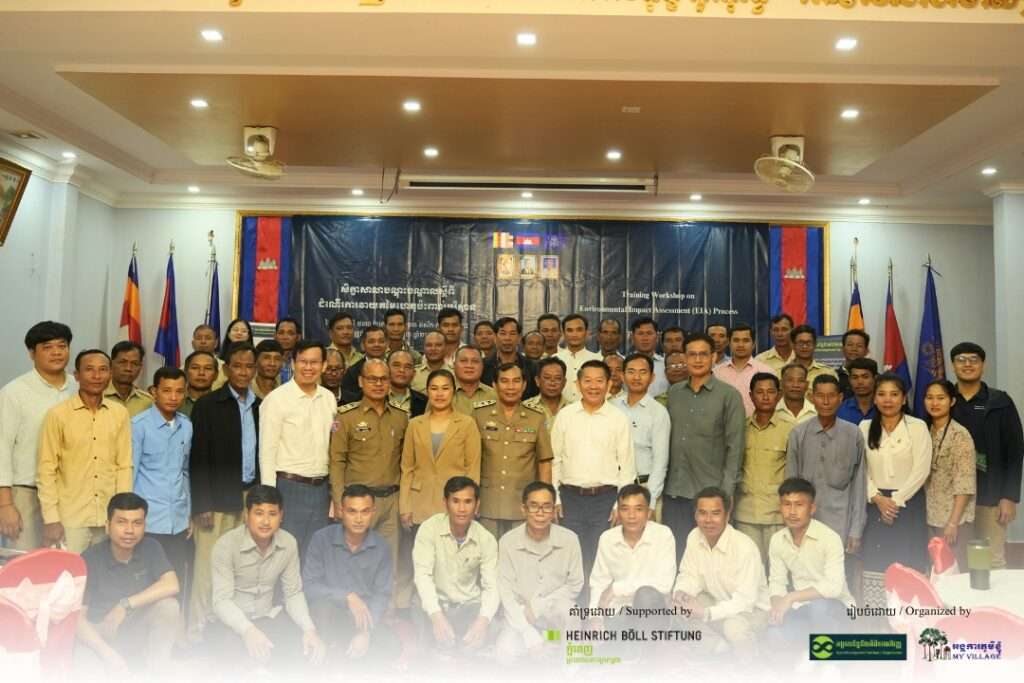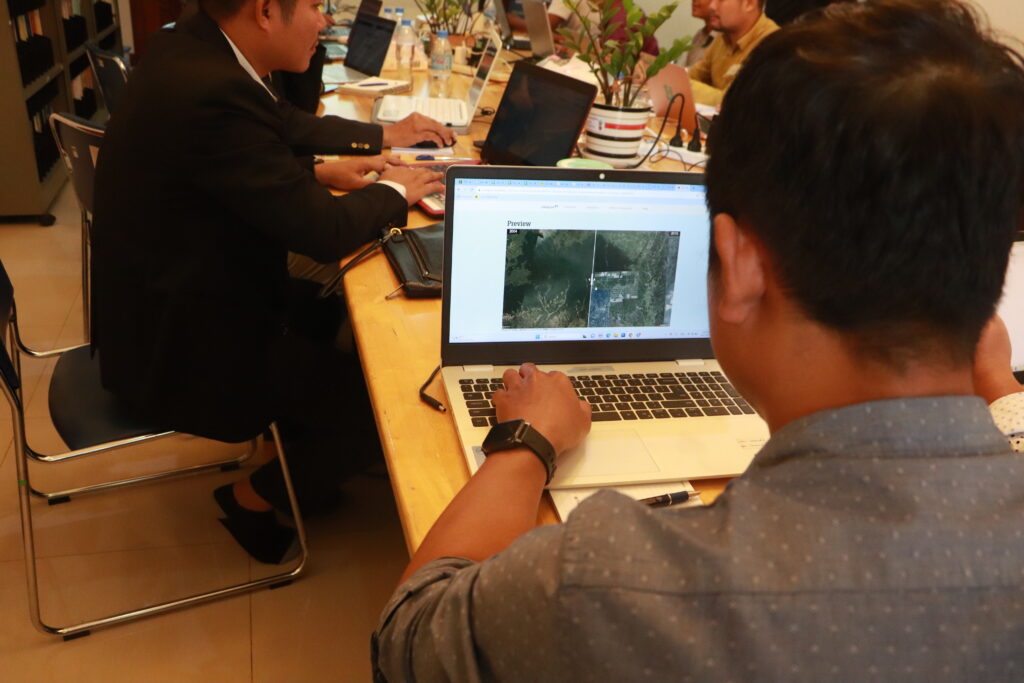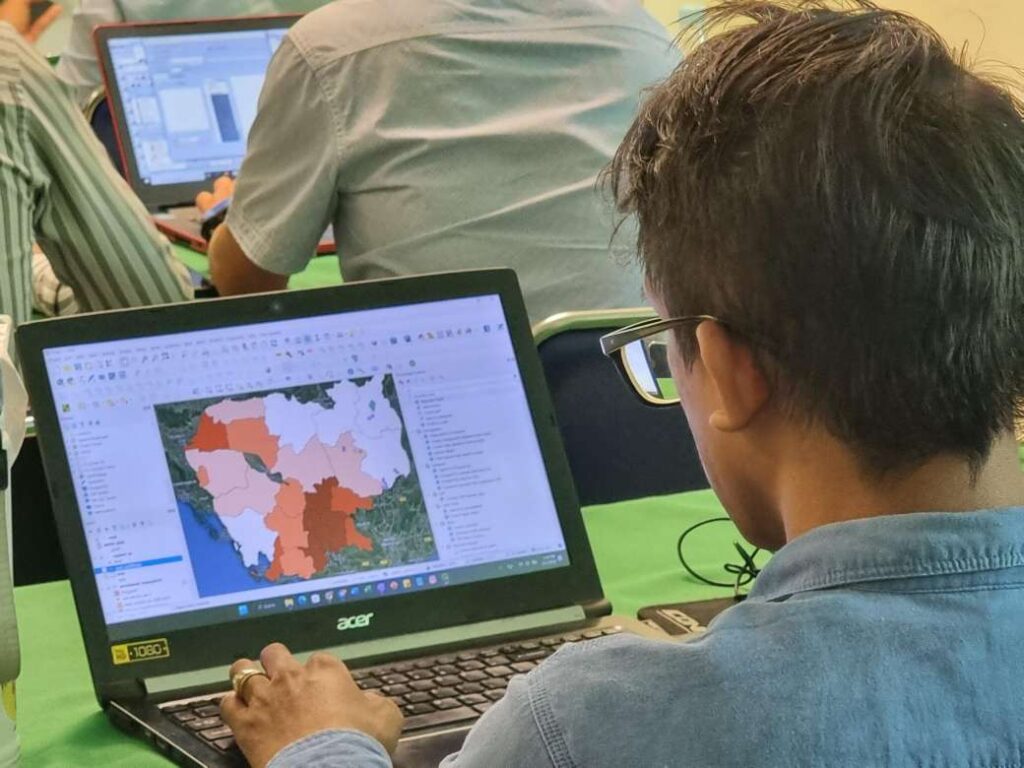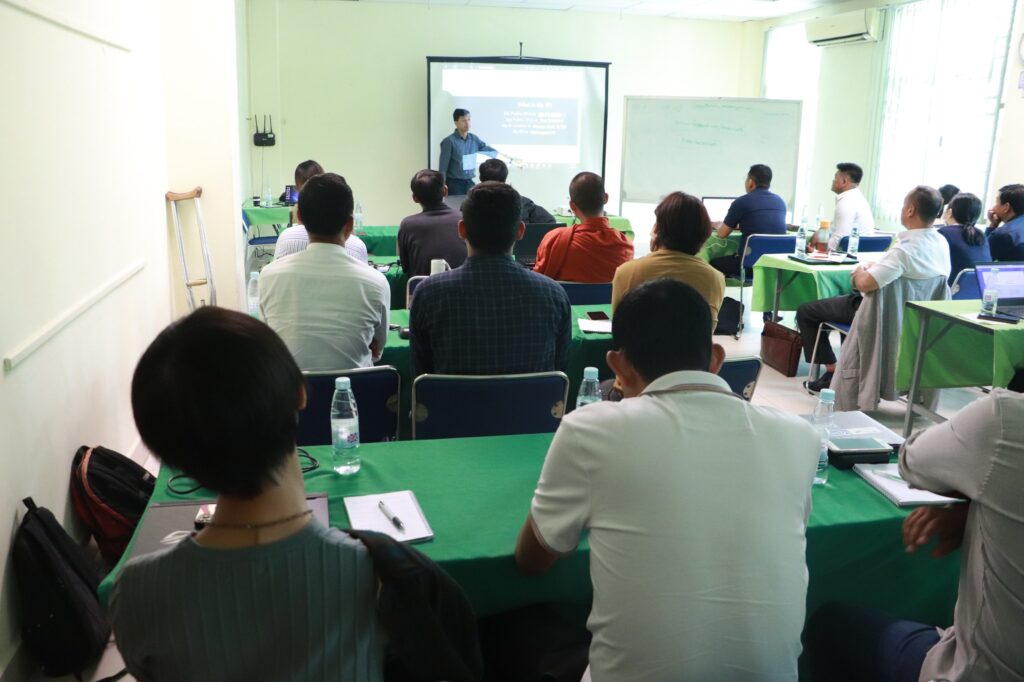Raise awareness of the communities on environmental impact assessment process
On 25 July 2025, Open Development Cambodia Organization (ODC) in collaboration with My Village Cambodia (MVi), under the project \"Enhancing Natural Resource Management Governance through Data-Driven Approaches,\" conducted an important training workshop on environmental impact assessment (EIA) in Mondulkiri province. This event aimed to raise awareness of the local communities and authorities with essential knowledge regarding EIA, fostering informed decision-making and active participation in environmental governance. The workshop gathered 60 participants, including representatives from the EIA Department of the Ministry of Environment, Mondulkiri Provincial Administration, Provincial Department of Environment, Provincial Department of Land Management, Urban Planning, Construction and Cadaster, local authorities, and community members. Despite the technical nature of EIA, the event emphasized the importance of community involvement in the EIA process. Welcoming remarks by Mr. THY Try, Executive Director of ODC Mr. THY Try opened the workshop by highlighting the alignment of the event with the Environment and Natural Resource Code (ENR Code), which mandates comprehensive EIA processes for development projects. He emphasized the critical role of EIA in sustainable development and encouraged participants to be actively involved in discussions, asking questions to extend their understanding and concerns. He also introduced the availability of the EIA and Foreign Investment Mapping (FIM) profile pages on the ODC website, expected to enhance public access to data. Opening remarks by Mr. NGIN Sovimean, Deputy Mondulkiri Provincial Governor Mr. NGIN Sovimean expressed his appreciation to participants and organizers, particularly acknowledging ODC and MVi’s efforts in hosting this event. He highlighted Mondulkiri’s developmental achievements across education, health, tourism, infrastructure, and agriculture sectors, emphasizing the essentials for sustainable development practices. Mr. Sovimean emphasized the province\'s commitment to applying EIA for informed decision-making. Detailed EIA process and legal framework presentation by Mr. CHEA Leng Mr. CHEA Leng, Deputy Director of the EIA Department at the Ministry of Environment, presented a comprehensive overview of the EIA process and its legal framework. He facilitated discussions, encouraging participants to share their experiences and challenges related to EIA. The workshop revealed varying levels of awareness among participants about EIA. Some were well-informed and actively participated in the EIA process, while others were unfamiliar. These discussions highlighted the need for continuous training and better communication regarding EIA, especially in the community. The Q&A session provided valuable insights into the EIA process. Participants raised concerns about specific projects and their impacts on local communities. Mr. CHEA Leng clarified that communities have the right to raise concerns and emphasized the importance of public participation in EIA. He also addressed misunderstandings about EIA delaying development, explaining that it aims to mitigate the environmental and social impact of the development projects. Key issues and community involvement Participants emphasized the need for clear and timely communication about development projects. They raised the community’s challenges including incomplete information, difficulty negotiating compensation for affected communities, limited internet access, and language barriers. They suggested the government improve internet services, ensure information is available in local languages, provide timely meeting notifications, and request more comprehensive documentation from project owners. Addressing these barriers can significantly expand information flow and community involvement and facilitate better decision-making and conflict mitigation. Presentation on the FIM and EIA profile pages by Mr. BAN Chanphalla Mr. BAN Chanphalla highlighted ODC’s role in promoting transparency and accessibility of development-related data through the Foreign Investment Mapping (FIM) and EIA profile pages. The page features key information about foreign investment projects and EIA reports, enhancing public awareness and participation in environmental governance. Closing remarks by Mr. Lonn Pichdara, Executive Director of My Village Cambodia (MVi) Mr. Lonn Pichdara concluded the workshop by thanking all participants and partners. He emphasized the importance of transparent information sharing and the need for further training and support for local communities. Mr. Pichdara recognized the workshop\'s significance in disseminating critical information and fostering stakeholder collaboration.
Data visualization training in journalism
On September 11th, 2023, Open Development Cambodia (ODC) conducted an enriching training session titled \"Data visualization in journalism,\" attended by a group of 14 journalists (2 females) from various locations such as Phnom Penh, Kratie, Siem Reap, Battambang, Stung Treng, and Mondulkiri. With our \"Data visualization in journalism\" training, the trainees can embark on a transformative journalistic journey that explores the intersection of data and narrative. Data visualization, the art of transforming raw data into compelling visuals, is more than a skill; it\'s a narrative accelerator. In an age when information bombards our senses, journalists with data visualization skills gain the ability to change complex datasets, transforming them into impactful graphs, interactive charts, and dynamic maps that bring stories to life. This course provides an opportunity to seamlessly combine journalistic skills with data-driven precision, unleashing the potential of visual storytelling to captivate, inform, and inspire. The training aims to equip journalists with the skills to integrate visual elements into their storytelling, enabling them to convey information, engage audiences, and unveil deeper narratives through impactful and accessible graphics. The primary objective of this training initiative is to equip journalists with the proficiency to incorporate visual elements into their narratives. By doing so, they acquire the ability to convey information effectively, engage their audiences, and unveil deeper layers of the narrative through compelling and easily comprehensible graphics. The comprehensive training program explored data comprehension, the principles of data interpretation, the art of chart design, and an introduction to the powerful data visualization tool, Datawrapper. Despite the constraints of time, the participating journalists displayed remarkable adaptability and tenacity, successfully producing visualizations and integrating them into their stories. These hardworking trainees exhibited a worthy commitment to learning this new tool and the concepts surrounding it. Their dedication resulted in the creation of 14 interactive visualizations, each addressing a diverse selection of topics using Datawrapper. While it is acknowledged that their efforts may not yet be considered professional, it is evident that they have acquired a fundamental understanding of how to develop visualizations that enhance their news articles. Furthermore, it notes that the majority of these participants have expressed a strong desire for additional training sessions. They are eager to extend the duration of training and remain enthusiastic about staying updated with the latest data and visualization techniques. These aspirations reflect their solid commitment to enhancing their capacities as journalists and their dedication to delivering high-quality journalistic content to their respective audiences. The project is funded by USAID Cambodia through FHI 360 under a Cluster Anchor Grant from the Civil Society Support (CSS) Project.
Basic of GIS and QGIS Training 2023
Training workshop on the basics of Geography Information System (GIS) and the use of QGIS (Quantum Geographic Information System) was announced on the Open Development Cambodia (ODC)’s platform and social media on 13th July 2023 to call for the participants to attend the workshop on 2nd-4th August 2023 in Phnom Penh. The post reached more than 32,000 people on social media, and there were 382 people registered for the training. Due to the quality insurance and budget limitation, there were 21 participants selected based on their backgrounds, knowledge, interests, and usage. The training brought together 21 trainees (five females) from various backgrounds and professions including government officers, civil society organizations (CSOs), community-based organizations (CBOs), private sectors, and university students. Most of them are working with GIS and have the potential to work with QGIS tools in the future. Ms. KOEM Chhuonvuoch, Natural Resources and Land Editor–Researcher/Project Coordinator of ODC delivered an open speech and gave a warm welcome. She encouraged all trainees to attend and focus on the training during these three days. She also highlighted how the 21 trainees are selected among more than 380 people. The trainees were then requested to do the pre-test in order to assess their capacity and understanding of the GIS. The result illustrated that only 35% of the questions were passed. After the pre-test, the trainees took a break before the core session. Mr. VONG Pisith, Senior Data Research & GIS Officer/Capacity Building Coordinator, and Mr. Loch Kalyan, Data Research and GIS Specialist of ODC trained the trainees on basic GIS, the introduction of QGIS tool and each function of it, and general knowledge of map and other related materials. The trainees were enthusiastic and kept interactive by asking questions and following up on the lessons. The trainees were then assigned to work on actual practice after learning the concept, theory, and tool. Most of them could catch up with the lesson, followed all the exercises, and practiced smoothly. Most of the trainee came to the events on time, and no one was absent during the three days of training. Ice-breaking activities were also included after lunch each day to warn the trainees. On the 3rd day’s last session, the post-test was provided to the trainees, and the result was much better, 59% of the questions were passed. To encourage and recognize the trainees, certificates were delivered to all trainees who attended the full training workshop.
Cybersecurity Training
On 04th July 2023, Open Development Cambodia (ODC) conducted training on cybersecurity for the CSS-cluster members and their networks. The training course aims to raise awareness of the cluster member on cyber security as well as digital security including password management, safe internet browsing, email security, and mobile security. We also provided participants with the essential skill to cope with issues related to cyberattacks and safeguard personal data and accounts. There are 32 participants (12 females) joining the training from ADHOC, NEP, YEA, Epic Arts, CHRAC, SVC, Bophana Center, CENTRAL, LoveIsDiversity, and other networks. To assess capacity, all trainees are required to complete the pre-test. Mr. NGET Moses, Digital Security Consultant, asked each trainee to introduce themselves, their position, organization, and their expectations of the training at the start of the training in order to understand their background and needs. He started the lesson on “password management” by providing an overview of passwords, creating strong passwords, and password managers. The questions were discussed around the topic with actual examples. He continued to the next lesson “safe internet browsing” which highlighted the threats and how to do safe browsing and virtual private network. Email security and mobile security are also very important for trainees. In this session, the trainer demonstrated how to secure mobile devices and emails. The session concludes with a summary of the lessons and a post-test to assess the trainees’ understanding. The evaluation was also requested in order to improve training. One of our trainees, SENG Sokcheat, a member of LoveIsDiversity express, “I think this training is very important as it helps us protect our privacy from online scammers. Also, everyone who is using social media, internet, or other online services should join this training.” The training was conducted under the Learning Platform (LP) project which was funded by the United States Agency for International Development (USAID) through Family Health International (FHI 360) as part of the Civil Society Support (CSS) Project.



